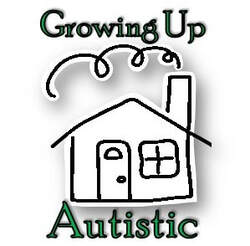
by Lonnie Pacelli
The Israeli Defense Force (IDF) Special intelligence Unit 9900 is dedicated to everything related to geography, including mapping, interpretation of aerial and satellite photographs, and space research. Within this unit there is another, smaller unit of highly qualified soldiers who can detect even the smallest details—the ones usually undetectable to most people. These soldiers all have one thing in common; they are on the autism spectrum. Their job is to take visual materials from satellite images and sensors in the air. With the help of officers and decoding tools, they analyze the images and find specific objects within the images that are necessary to provide the best data to those planning missions. The IDF has also found that soldiers with autism can focus for longer periods of time than their neurotypical counterparts.
0 Comments
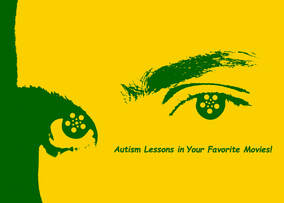
by Lonnie Pacelli
Recently our son Trevor published a blog post entitled Every Oscar Winner for Best Picture, Ranked Worst to Best. In this post, he ranks, from 90 to one, each and every Oscar winner since Wings won the very first Oscar in 1928. Each winner is listed by the movie name, year it won, a picture from the movie, and a review summary. It took him three years to watch, review and rank the movies, which he did in addition to living a full work and social life. The ranking list, whether you agree with where they fall or not, is not only a fun read but is a major achievement for Trevor. 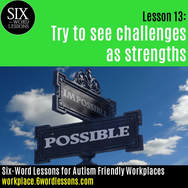 By Patty Pacelli While watching for strengths, be aware of subject areas or tasks that are challenging or difficult for your child. Keep them in mind when envisioning the future, but consider how a challenge at home could be a strength in the workplace. Trevor was hypersensitive about being on time, which caused conflicts with the family occasionally, but it became a strength when he had his first job. Learn more about strengths and challenges that could translate to the workplace in my book, Six-Word Lessons for Autism-Friendly Workplaces.  Pixabay Pixabay
By Patty Pacelli
Human beings were made to work, and adults with autism are no different. Employment leads to a better mood, higher self-esteem, and improved physical health. It allows autistic adults to further develop their skills and understanding. Our son Trevor liked being around people and enjoyed the feeling of accomplishment at his jobs.  Photo by JESHOOTS.COM on Unsplash Photo by JESHOOTS.COM on Unsplash
By Lucy Wyndham, freelance writer
Neurodiversity is the idea that the neurological differences behind autism, ADHD, and many other intellectual disabilities are the result of normal variations in the human genomes and not pathologies to be cured. Autistic individuals have long found it difficult to find employment, but as the concept of neurodiversity is beginning to take root, companies have begun to recognize the benefit of hiring neurodiverse talent.  Northwest Center of Seattle recently hired Trevor Pacelli, a young adult on the autism spectrum, and one of his duties is to write blog posts for the company. In this post, he has written about his experiences with his past jobs and the varying degrees of inclusion in those workplaces. Northwest Center is a nonprofit company that " . . . was founded in 1965 by parents who refused to institutionalize their children with developmental disabilities or accept the prevailing notion that their children couldn't be taught. Banding together to form Northwest Center, they hired their own teachers to develop education programs targeted to special needs children." (NWCenter.org) Their mission is "to promote the growth, development and independence of people with disabilities through programs of education, rehabilitation, and work opportunity." Trevor is thankful and excited to be working for Northwest Center. 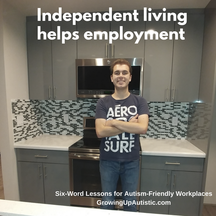
By Patty Pacelli
Independent living is an important goal for young adults with autism, and studies have shown that it can lead to better employment success. The process can start early in life, and there are several things to help meet this goal while still living at home. 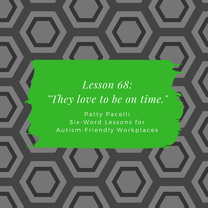
By Patty Pacelli
Like many people with autism, our son Trevor has always been very aware of time, and likes to stick to a schedule. He owned and used a watch from preschool on, and that attention to timeliness helped him when he had a job. Because autistic individuals thrive on routine, schedules and predictability, they will rarely, if ever, be late to work or meetings, which is a dream for employers. 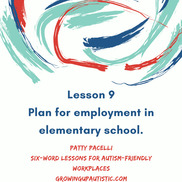 By Patty Pacelli For children on the autism spectrum, start career planning as soon as your child starts developing interests. The elementary school years are perfect for this, but at least by age 14. Taking note of their interests, especially their passions, can help them pursue and cultivate them. If they talk about dreams that seem unrealistic, encourage them anyway. You never know what they will be capable of as they grow and develop. Take their interests a step further by finding household tasks or volunteer work that will help them explore and develop their passions while learning good basic work skills and lead to independence and better employment. For more about preparing your child with autism for the workplace, check out Six-Word Lessons for Autism-Friendly Workplaces, in paperback and e-book. 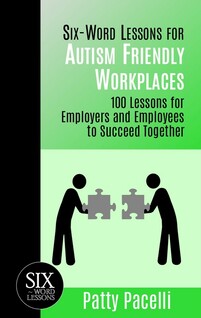
By Patty Pacelli
Parents should begin thinking about employment for their children on the autism spectrum when they are very young. Involving them in household chores, volunteer work and other projects will help prepare them for employment later on. Our son Trevor had weekly chores and took care of his own needs as much as possible, and as early as possible. He was choosing his own clothes, making his own breakfast, and getting himself up in the morning with an alarm by about 10 years old. By middle school, he was making his own lunch to take to school as well. He learned to take care of the cat, clean the bathroom and vacuum in elementary school as well. He found comfort in these weekly chores because of his need for routine and schedule-keeping. These tasks can help your child to become a dependable employee later on. |
Inspiration for Life with AutismThis blog has a variety of articles about people living life with autism, and topics and ideas that can help in the journey. Guest bloggers are welcome. Inspired by Trevor, a young adult film critic, photographer and college graduate on the autism spectrum. Categories
All
Archives
July 2024
|
Proudly powered by Weebly
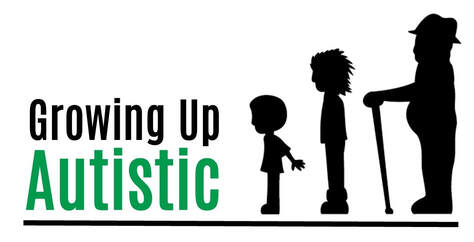
 RSS Feed
RSS Feed